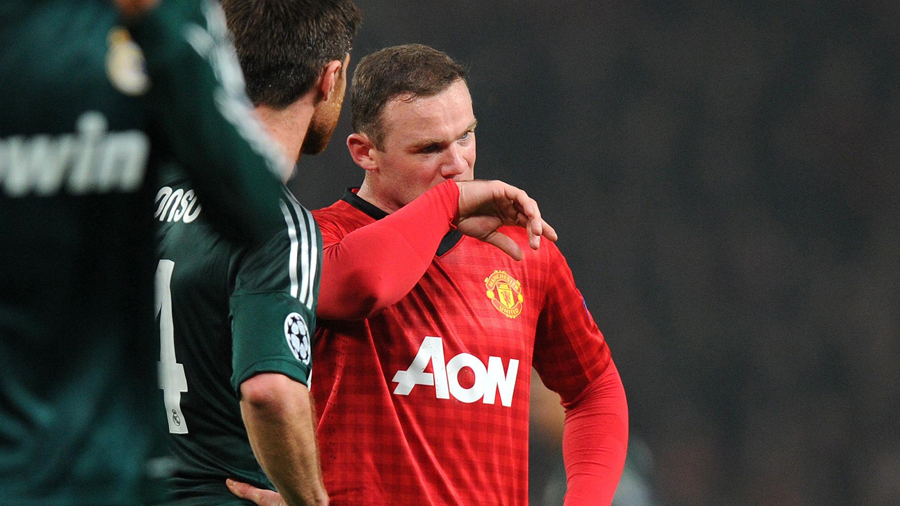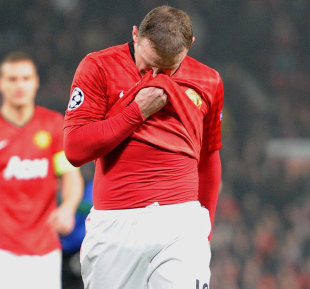- Premier League
The Wayne Rooney domino effect

For all of the ongoing debate and indecision, the current Wayne Rooney situation effectively started with a moment of searing clarity.
It was early spring, shortly before that fateful Champions League defeat to Real Madrid, when Alex Ferguson reportedly came to a conclusion. It wasn't about his future, but rather that of the player once considered the future of Manchester United.
Although 27 and notionally entering the prime of his career, Rooney had gradually come to be seen as sellable. So, according to ESPN sources, Ferguson went to former chief executive David Gill and told him that the club likely had seen the best of Rooney at Old Trafford. It would be a good time to sell and freshen up the attack.
One long-standing and influential United employee put that position into proper context by going even further. "Wayne is here longer than [Eric] Cantona, [Andy] Cole, [Ruud] Van Nistelrooy, Ole [Gunnar Solskjaer]. Everyone has their time."
Although new manager David Moyes does not share either that view or Ferguson's, and actively wants Rooney to stay, it was the initial conclusion that created the current situation and has given United such a genuine quandary.
First of all, the former manager's stance ultimately hardened the forward's own doubts to the point that he is now determined to leave Old Trafford. Although it would be incorrect to say Ferguson forced him to that decision, it is not all on Rooney's side.
Secondly, there is probably a strong degree of truth to the 71-year-old's conclusion.
Even if Rooney is not yet finished as an elite player and may well have much more to come, it seems unlikely that he will deliver it at United. Quite simply, it's all gone a bit stale.
Undeniably, there is an element of fault on both parts. Although Rooney was once seen as the most exciting young forward in the world and even outshone Cristiano Ronaldo at Euro 2004, he has spent all but one season in the past eight years shunted around the pitch and essentially servicing brighter lights like the Portuguese. Part of that, however, is because Rooney never honed his supreme natural talent in the manner players such as Ronaldo did. It has meant he has never truly devastated or dominated teams for a consistent period in the manner that he so outrageously suggested in that Euro 2004 game against France.
Now eight years on at United, all of that has led to a situation that feels much more fundamentally human than anything to do with sport or the specifics of Rooney's situation. He is an employee who just needs a change of scenery to rediscover his verve. Many outside of football have been there.
It is this that has created such a dilemma for United.
While Moyes is fully confident he can restore Rooney's energy at Old Trafford, there remains the danger that a player unintentionally going through the motions also can take the vitality out of United's attack. Robin van Persie may have given the side an impressive spark last season but, for a variety of reasons, it was starting to wane toward the end of the campaign.
The sale of Rooney would aid that, as Ferguson initially intended, as well as boost an already ample transfer fund. The big problem is to whom would United be selling. The club had been in advanced talks with Paris Saint-Germain in May, but the player's reluctance to go to France has left Chelsea as the only genuine suitors.
Worse for United, it is a Chelsea now helmed by Jose Mourinho: in other words, exactly the type of manager who could derive the kind of rousing response that Rooney requires.
The Portuguese coach has a track record of doing so and, apart from resistant stars like Iker Casillas, he is famous for fostering deep emotional relationships with his players that result in maximum commitment. Rooney is known to be hugely enthused by that prospect. It also has been noted at Carrington that this summer, which happened to be the very one in which he has decided to leave, Rooney returned in "the best shape for five years," according to Moyes.
It is far from inconceivable that Mourinho will go on to help him produce his best form for five years, too. In allowing that to happen, United could at once badly weaken themselves while also greatly bolstering one of their title rivals. On the other hand, keeping him could create a situation where United's attack continues to stagnate while their rivals strive ahead in bold new directions.
This is the quandary.
As such, one thing in all this seems certain: while Moyes' stance on selling Rooney is not completely hardline, United will not let him go unless they are sure of their own reinforcements.
This domino effect is where it gets interesting. It was also something that Mourinho referenced as he made his latest public play for Rooney on Tuesday.
"The market is open until 2 September and many clubs are waiting to the last moment to make their decisions, and those decisions affect a number of other clubs. The one who sells has to go and buy, then they have to buy to replace, so no club is safe."

United had been willing to let Rooney go in the event of signing Robert Lewandowski but, despite early encouragement from the forward's representatives, it will take all manner of wrangling to prevent his eventual move from Borussia Dortmund to Bayern Munich. Similarly, the Old Trafford club are much less confident of making the hugely difficult return of Ronaldo actually happen. United are prepared to put in a bid for Tottenham Hotspur's Gareth Bale, but that is seen as outlandish. Aside from the Welsh forward's happiness in London, it is widely known his dream is to move to Real Madrid at some point.
It is for these reasons the potential purchase of Cesc Fabregas could hold the key to this entire saga, yet also ensures it could go on for a while yet.
United's persistence in pursuing the Catalan is based on positive talks with Fabregas' camp, but the recent change of manager at Barcelona from Tito Vilanova to Tata Martino -- as well as all of the trivial and unfortunately tragic aspects surrounding that -- do complicate proceedings. Moyes may have to wait and even then be disappointed. A successful purchase would be a different matter.
Given that Fabregas' signing would be exciting enough to overshadow a Rooney exit as well as sufficiently recalibrate the front end of United's team along with what will surely be a more settled Shinji Kagawa, it may be enough to set things in motion. It may lead to Chelsea's bid then being accepted.
That, however, is still prone to all manner of potential pitfalls and doubts.
None of that for Mourinho. He is as clear-minded as Ferguson was. Rooney is hugely important for the Chelsea system, and that move may be crucial in revitalising Rooney.
It is that very prospect, though, that creates such uncertainty for United.
Miguel Delaney is London correspondent for ESPN and also writes for the Irish Examiner, the Independent, Blizzard and assorted others. He is the author of an award-nominated book on the Irish national team called 'Stuttgart to Saipan' (Mentor) and was nominated for Irish sports journalist of the year in 2011

